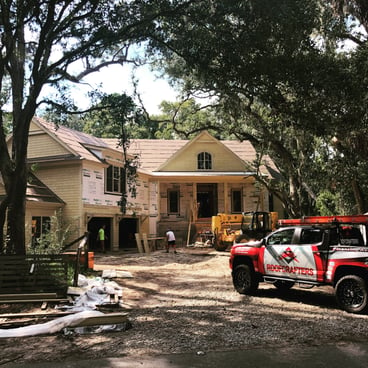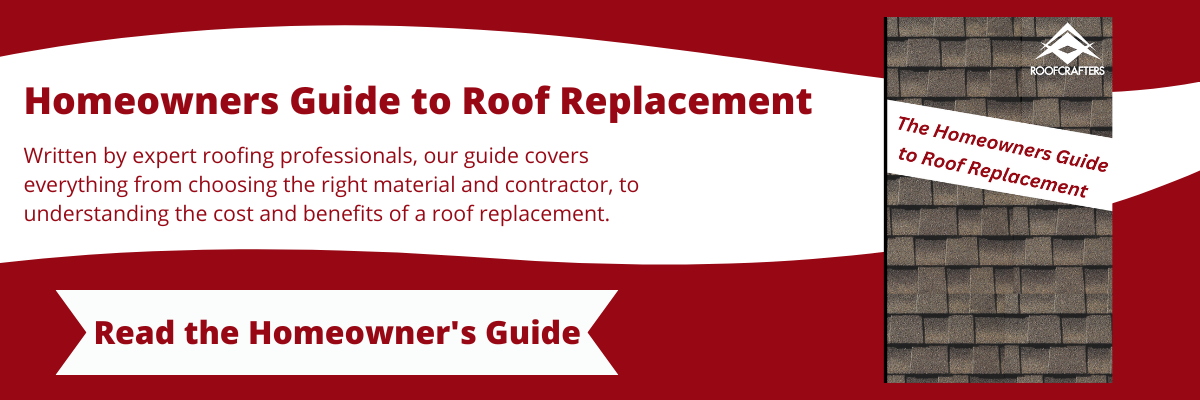
Whether you're getting a new phone, a car, or even a cool kitchen gadget, having a warranty brings the peace of mind that you're protected from trouble. Now, when it comes to your roof, you'll definitely want the best warranty you can get your hands on. Why?
Your roof is a huge deal. It's a steep investment that protects your home and everything that inhabits it (like you and your family). So, when you get work performed on it, having a top-notch roofing warranty gives you the peace of mind that something has your back if you run into issues down the line. It's like having a safety net for installation blunders, faulty materials, and so much more.
After nearly 30 years in the game, RoofCrafters has noticed a common hiccup: folks needing to be clued in more about their roof warranty options! That's why we always take the time to guide our customers through their warranty choices, ensuring they get the right coverage for their homes. In this article, we'll review the ins and outs of standard roof warranties. By the time you finish reading, you'll know what this warranty type stands for and a little bit extra about your other choices!
Your Roof Warranty Options Explained
Really quickly- although it may seem like there are endless warranties to pick from, there are really only a few.
- The standard manufacturer's warranty covers the products you purchase. For example, a standard roofing warranty should include coverage for any defects like wind damage up to 130 mph, algae growth, necessary tear-offs, cracks, or other material defects.
- A workmanship warranty from your contractor covers the installation. For example, a workmanship warranty is applied by the contractor to help protect you from careless work that leads to needing repairs or another replacement.
- An extended manufacturer's warranty that covers contractor workmanship along with expanded coverage for the products. For example, some manufacturers partner with contractors to provide a warranty extending your standard selection.
Standard Manufacturers Roof Warranties
Most roofing shingles usually have what's called a basic limited lifetime warranty, which, as we discussed, is a "promise" from the company. But here's the thing: this "lifetime" deal often means you're covered only while you own your home. What you get protected for depends on how they define "limited," and this can change depending on the company:
Usually, the warranty only covers the cost of faulty materials, meaning you might have to pay for any work needed to take off the rotten shingles and put on new ones. During the first few years, the company might replace faulty shingles for free. After that, they might offer something called prorated coverage. That means if shingles go bad during this time, the company might just pay part of the cost for new shingles or give you a smaller amount of new ones.

But here's the catch: These warranties usually only cover factory issues – problems made when the shingles were made. They don't cover problems that happen because the shingles were put on the wrong way or any other parts, like underlayment or flashing. Sometimes, these different parts have their own warranties against problems.
So, while the warranty might seem like a lot, it might not cover everything that could go wrong with your roof.
Protecting Your Warranty: Four Steps
No homeowner wants to deal with a claim only to discover their roof replacement warranty is kaput. Sadly, that's what happens when folks assume they're covered.
To keep your coverage intact, follow these four simple steps:
- Regular Check-ups: Get your roof checked every one or two years. It helps your contractor spot and fix minor issues before they become big problems. By staying on top of repairs, you keep your warranty coverage.
- Stick with Your Contractor: If you liked the contractors who installed your roof, stick with them. Most contracts void the warranty if another company messes with the original work. Keeping the same contractor ensures they fix their own mistakes and safeguards your investment.

- Registration: Make sure to send in your warranty registration to the manufacturer; without it, you might not have coverage. Keep in mind that the process can differ for enhanced warranties. Your contractor, the one installing the product, needs to be qualified and registered to offer the warranty. They should take care of registering the warranty on your behalf. This upgraded coverage involves more than just mailing in a form.
- Sort Through the Details: Your contractor should be certified by the shingle manufacturer and authorized to provide the specific warranty. If they lack this authorization, your warranty could be canceled. Understand the certification level needed for your warranty. Higher certifications allow contractors to offer better warranties, giving you a higher chance of keeping your coverage intact.
Think of your roof as a shield for your family and belongings. Just as it protects your home, you need to safeguard the warranty. Following these steps ensures you won't be caught off guard with a voided warranty when you make a claim!
Do You Understand Roof Warranties?
Understanding roof warranties is crucial for every homeowner embarking on a roofing project. Manufacturers' warranties, typically the industry standard, offer coverage for material defects, but homeowners need to be aware of their limitations. It's like having a baseline, but we can't always rely on it alone!
Choosing the proper warranty involves carefully examining coverage, transferability, and conditions. It's not just about having a warranty but having one that aligns with your specific needs and concerns. As you navigate the roofing landscape, armed with knowledge about these warranties, you empower yourself to make informed decisions that safeguard your home and investment. So, when it comes to roofing warranties, knowledge truly is your strongest shield.
To learn more about what roof warranty options are available to you, check out our learning center! From commonly known to unique warranty information, we have the resources you need to make the right decision for you and your home. If you think you're ready to begin the process of choosing a new roof, RoofCrafters is thrilled to assist you! To get in touch with one of our friendly representatives, take a leap over to our contact page.
My name is Kevin Mills, and I am the lead estimator for RoofCrafters’ Tampa division. I’m originally from Michigan, and I enjoy hunting, fishing, and spending any free time outdoors. What I’m most passionate about, though, is helping business owners and homeowners alike achieve their roofing goals, all while providing a seamless customer journey.




